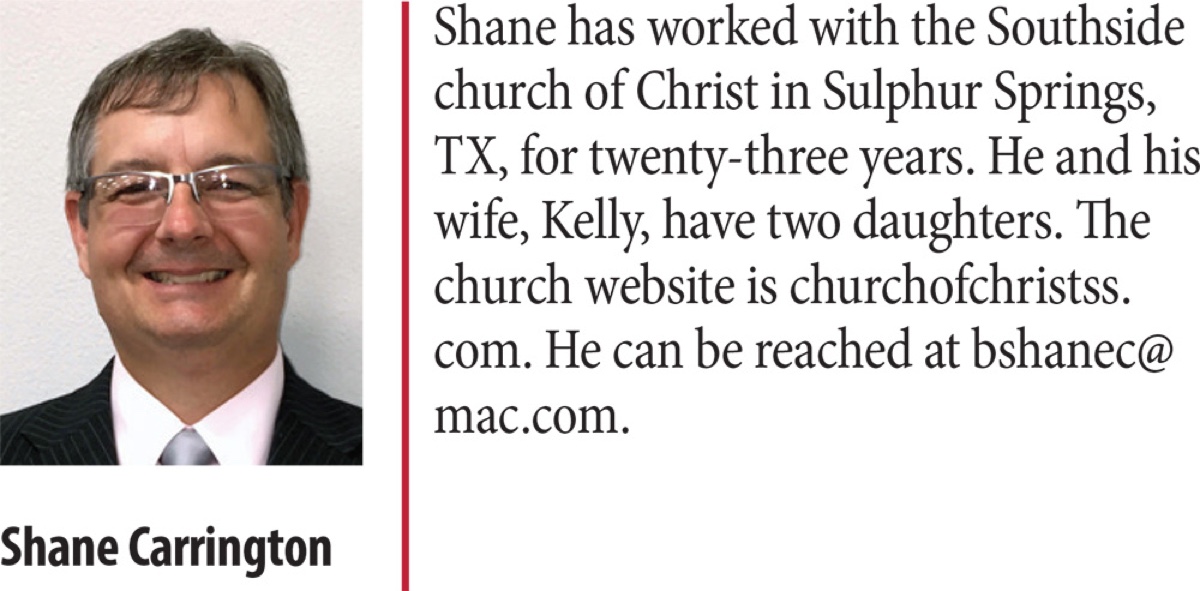by Shane Carrington
Synopsis: Saints today share much in common with first century disciples, significant differences exist. While we do not possess the miraculous gifts of revelation and confirmation, we have something better: the full and final message of salvation!
God has called and sent many messengers through the ages: angels, prophets in both testaments, the apostles (defined as “ones sent”), and Jesus.
Of John the baptizer, the Lord said, “Behold, I am sending My messenger, and he will clear a way before Me” (Mal. 3:1a; cf. Matt. 11:10; Mark 1:2; Luke 7:27). He was God’s special messenger preparing the way for the coming of Jesus!
Concerning Paul, Jesus said, “He is a chosen instrument of Mine, to bear My name before the Gentiles” (Acts 9:15). Regardless of the specific focus of their labors, this general statement applies to all apostles. Jesus chose the original apostles: “These twelve Jesus sent out after instructing them. . .” (Matt. 10:1-5). Subsequently, He chose Matthias as Judas’s replacement: “And they prayed and said, ’You, Lord. . . show which one of these two You have chosen to occupy this ministry and apostleship” (Acts 1:24-26). Then He chose Paul: “. . .last of all, as to one untimely born, He appeared to me also. For I am the least of the apostles. . .” (1 Cor. 15:8-9).
Jesus summoned His twelve disciples and gave them authority over unclean spirits, to cast them out, and to heal every kind of disease and every kind of sickness. Now the names of the twelve apostles are these: The first, Simon, who is called Peter, and Andrew his brother; and James the son of Zebedee, and John his brother; Philip and Bartholomew; Thomas and Matthew the tax collector; James the son of Alphaeus, and Thaddaeus; Simon the Zealot, and Judas Iscariot, the one who betrayed Him. These twelve Jesus sent out after instructing them. . . (Matt. 10:1–5).
And they prayed and said, “You, Lord, who know the hearts of all men, show which one of these two You have chosen to occupy this ministry and apostleship from which Judas turned aside to go to his own place.” And they drew lots for them, and the lot fell to Matthias; and he was added to the eleven apostles (Acts 1:24–26).
. . . and last of all, as to one untimely born, He appeared to me also. For I am the least of the apostles, and not fit to be called an apostle, because I persecuted the church of God (1 Cor. 15:8–9).
That is elite company. These special messengers sent by God—angels, prophets, apostles, Jesus—were foundational in God’s work of redemption. As the church, we “are fellow citizens with the saints, and are of God’s household, having been built on the foundation of the apostles and prophets, Christ Jesus Himself being the cornerstone” (Eph. 2:19-20). Their work undergirds our faith and hope. Paul spoke of “the mystery of Christ, which in other generations was not made known to mankind” which “has now been revealed to His holy apostles and prophets in the Spirit” (Eph. 3:4-5). They “wrote” so that “when you read you can understand. . .” (Eph. 3:3-4). It is in this special sense that the apostles are referred to as “ambassadors of Christ” (2 Cor. 5:20).
To men such as these, Jesus promised inspiration. "When He, the Spirit of truth, comes, He will guide you into all the truth.. (John 16:13; Acts 1:5-8). This equipped them to speak and write God’s word completely and accurately. Inspiration also equipped them when they were put on trial:
But when they hand you over, do not worry about how or what you are to say; for what you are to say will be given you in that hour. For it is not you who are speaking, but it is the Spirit of your Father who is speaking in you (Matt. 10:19-20).
Those were special times where God equipped select men with special powers for special purposes. However, what about someone today who exclaims, “God directly called and sent me as His special messenger!”? While God providentially blesses all disciples with abilities and responsibilities, not any of us are His special messengers, like the apostles or prophets, for not any of us are inspired or miraculously led by the Holy Spirit. Note differences between apostles and prophets—and believers today:
God commissioned a few of them for a limited time. There were few apostles in the sense of the original twelve, plus Matthias, plus Paul. This special call was for only a few men. God only gave “some” to be apostles and prophets (Eph. 4:11-12), but all disciples are to be soul-winners (Matt. 28:18-20).
God granted special powers for a limited period, lasting until the inspired word was completely made known (1 Cor. 13:5-13). Apostles and prophets ceased toward the end of the first century. No one today possesses such powers.
God directly addressed them through the Holy Spirit (cf. Acts; etc.). He speaks to us through the written word (see Eph. 3:3-5; 2 Tim. 3:16-17; 1 Cor. 4:6; Heb. 10:15-17; Rev. 2 & 3).
God empowered them to teach and preach without studying (Matt. 10:19-20, etc.). Disciples today must study the first century writings of the apostles and prophets to know what to say and how to say it: “Be diligent to present yourself approved to God as a workman who does not need to be ashamed, accurately handling the word of truth” (2 Tim. 2:15). As H. B. Charles, Jr. said, “A passion to preach without a burden to study is a desire to perform.”
All disciples are commissioned to preach Jesus, win souls (Acts 8:4), and edify their brethren (Eph. 4:15-16). The writings of the apostles and prophets equip us unto this work. For us to assume a similar commission implies a failure by the apostles and prophets to fulfill God’s purpose through them (Matt. 19:28; John 20:23; 2 Tim. 3:16-17).
Arrogant pride concludes, “God knew no one could do this like me.” Misguided priorities like this must give way to a spirit of humility (Phil. 1:15-18).
Everyone desires being a difference-maker. Although the one-talent man fell short, it was not because he lacked ability. Lacking the skill to manage two or five talents made him no less important. What was his problem? He didn’t use the ability he possessed (Matt. 25:14-30). Whatever our abilities, may we employ them as good stewards in God’s kingdom—and grow in using those talents. Whatever responsibilities God invests in us (being a parent, preacher, personal worker, etc.), let us be faithful to God who blesses us with such opportunities. Get busy. Stay busy. Let’s make what difference we can, whether we are publicly known or act privately (Acts 20:20).
Everyone likes feeling important, being special—a difference-maker! However, Jesus defines true importance as child-like humility (Matt. 18:1-4), even if that means providing “just a cup of cold water” (Matt. 10:42).


